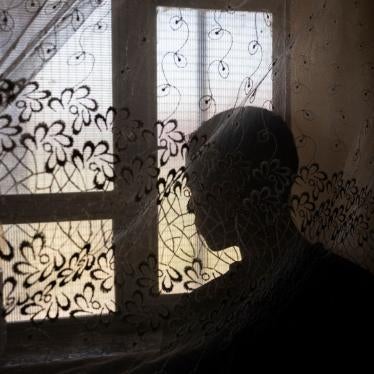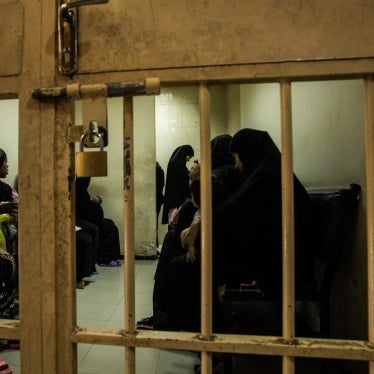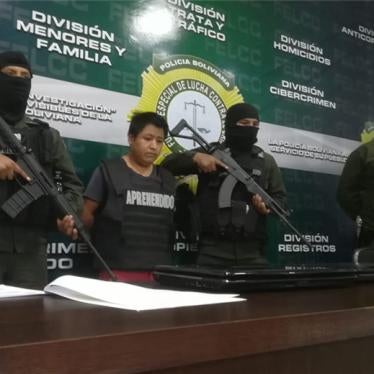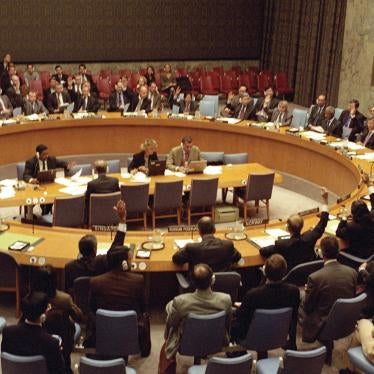The government of El Salvador should dismiss terrorism charges brought against protesters who allegedly blocked roads and threw stones at a July 2 demonstration, Human Rights Watch said today.
On July 2, a public protest in the Suchitoto municipality against a national plan to decentralize water distribution ended in a violent confrontation between police and protesters. Protesters blocked public roads and threw rocks at police, while police fired tear gas and rubber bullets at protesters. Police also alleged that protesters fired shots, although none of the press coverage of the demonstration mentioned that protesters were shooting.
Fourteen people were arrested and subsequently charged with “terrorism”: 10 of them were charged on the basis of alleged involvement in the roadblocks and rock-throwing, and three others on the basis of additional claims that they used firearms against police. (Charges against the remaining defendant, who allegedly interfered with police operations, were provisionally dropped.) An appellate court sustained the charges against the 13 defendants, but found that the firearms allegations were not even minimally supported by the evidence.
If convicted, the defendants will face 10 to 15 years in prison.
“Blocking roads and throwing rocks may well be crimes, but they’re not acts of terrorism,” said José Miguel Vivanco, Americas director of Human Rights Watch. “The Salvadoran government can legitimately prosecute protesters who break the law, but it should not misuse counterterrorism legislation against less serious crimes.”
Although the international community has not agreed on a precise definition of terrorism, it is widely understood that the term applies only to the most serious crimes of political violence, directed at instilling fear in the population in order to achieve a political goal: “the peacetime equivalent of a war crime,” in the words of United Nations Terrorism Prevention Branch expert A.P. Schmid. El Salvador’s use of terrorism charges for less serious crimes allegedly committed during a political protest is inappropriate and represents a misuse of counterterrorism legislation.
El Salvador’s Special Law Against Acts of Terrorism, which entered into force in November 2006, does not include an explicit definition of terrorism.
The closest the law comes to defining terrorism is in Article 1, which provides that the purpose of the law is to prevent and punish crimes that “by their form of execution, or means and methods employed, evidence the intention to provoke a state of alarm, fear or terror in the population, by putting in imminent danger or affecting peoples’ life or physical or mental integrity, or their valuable material goods, or the democratic system or security of the State, or international peace.”
The provision used in the present case purports to criminalize “acts of terrorism against the lives, physical integrity or liberty of public officials and internationally protected persons,” but it makes no reference to terrorism in its operative language. Nor does it require showing that the prohibited act provoked a state of alarm or terror in the population (Article 5).
Instead, the part of the provision used against the 13 defendants simply criminalizes actions aimed at “destroying or damaging” the belongings of government officials. The provision covers a wide variety of acts that do not fall within any reasonable definition of terrorism.
The counterterrorism law contains other overbroad provisions as well. Besides criminalizing incitement of terrorism, Article 8 of the law imposes a sentence of five to 10 years on anyone who publicly justifies terrorism.
Article 6 prescribes a prison sentence of 25 to 30 years for people who participate in “taking or occupying, in whole or in part” a city, town, public or private building, or a variety of other locations, through the use of weapons, explosives or “similar articles,” when these acts “affect ... the normal development of the functions or activities” of the inhabitants or other users of the location. Again, this provision criminalizes a variety of actions that do not fall within any reasonable definition of terrorism.
Human Rights Watch called on the Salvadoran legislature to amend its counterterrorism law to ensure that it is only applicable to certain very dangerous acts that are committed with the requisite intent and could thus be reasonably deemed acts of terrorism. In addition, the legislature should amend or repeal several provisions of the law, including articles 5, 6 and 8, which are vague and overbroad, and which prescribe sentences that are disproportionate to many of the crimes they encompass.
Human Rights Watch also called on the Salvadoran authorities to put in place safeguards to prevent inappropriate use of the counterterrorism legislation instead of ordinary criminal law, in particular where such use could be politically motivated.








